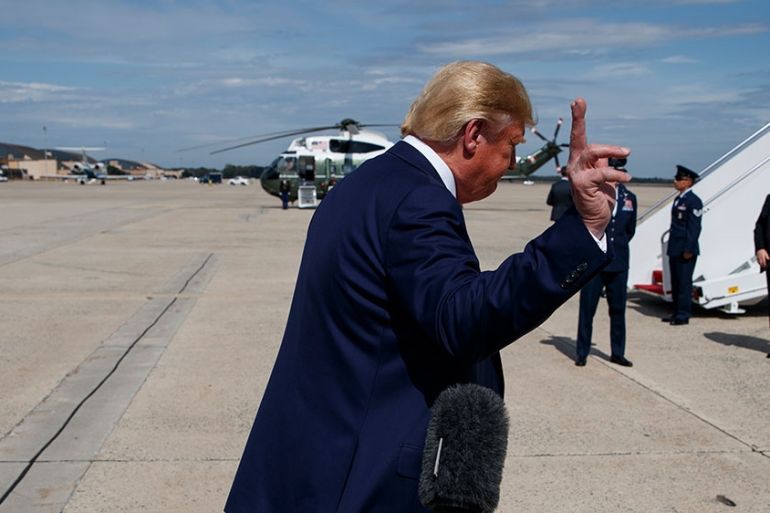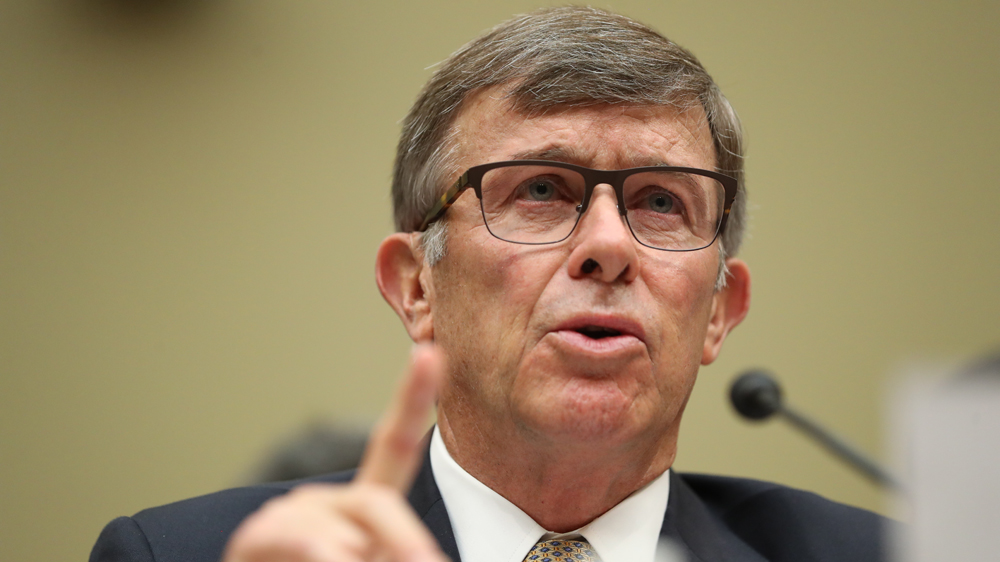Whistle-blower complaint: What does it say?
Key takeaways from the redacted whistle-blower complaint involving US President Donald Trump.

A whistle-blower complaint about United States President Donald Trump‘s communcation with the new president of Ukraine lays out concerns about multiple actions taken by the Trump White House and its allies that suggest the president was using his office “to solicit interference from a foreign country” to boost his reelection prospects.
The complaint, written by an unidentified member of the US intelligence community, was released on Thursday. The House Intelligence Committee also grilled the acting US spy chief on details of the redacted complaint.
Keep reading
list of 4 itemsWho benefits from US tariffs on Chinese imports? Experts weigh in
‘Any time, any place’: Biden and Trump agree to June and September debates
Biden slaps new tariffs on Chinese imports, ratcheting trade war
A few key takeaways from the complaint and the hearing:
It’s about far more than just a summer call
The complaint discusses a July 25 phone call in which Trump prodded Ukraine’s Volodymyr Zelensky to work with Trump’s attorney general, William Barr, and Rudy Giuliani, Trump’s personal lawyer, to dig up dirt on the son of Democratic rival Joe Biden.
But it goes well beyond the call. For example, the complaint details how Ukrainian leaders met with the US special representative for Ukraine negotiations and others on how to “navigate” the demands made by Trump. Giuliani met with Ukraine advisers in August as a “direct follow-up” to the all.
A cover-up is alleged
The complaint says that in the days after the July 25 phone call, the whistle-blower learned that senior White House officials had intervened to “lock down” all records of the call, especially the rough transcript produced by note-takers in the White House Situation Room.
White House officials told the whistle-blower they were “directed” by White House lawyers to remove the electronic transcript from the computer system where such records are typically stored.
“This set of actions underscored to me that White House officials understood the gravity of what had transpired in the call,” the report said.
The officials raised concerns that the transcript was moved to a separate computer system. White House officials told the whistle-blower that “this was ‘not the first time’ under this Administration that a Presidential transcript was placed into this codeword-level system solely for the purpose of protecting politically sensitive – rather than national security sensitive – information,” the complaint said.
Rudy, Rudy, Rudy
The report says that many US officials told the whistle-blower that they were deeply concerned about Giuliani’s efforts to circumvent the national security decision-making process to engage Ukrainian officials and relay messages back and forth.
“The President’s personal lawyer, Mr Rudolph Giuliani, is a central figure in this effort,” the complaint said.
In the call, Trump prodded Zelensky to work with Giuliani and Barr to investigate Biden and said that Giuliani would be calling him.
The whistle-blower said in the complaint that Giuliani travelled to Spain in early August to meet with one of Zelenskiy’s advisers and that US officials characterised the meeting to the whistle-blower as a “direct follow-up” to Trump’s call.
The complaint also states that several US officials told the whistle-blower that Giuliani had privately reached out to other advisers to the Ukrainian leader.
In an interview with The Associated Press this week, Giuliani said that he had spoken to a Ukrainian official at the request of Trump’s State Department.
What about the money?
The whistle-blower said the National Security Council and Office of Management and Budget did not know why Trump held up millions of dollars in aid for Ukraine.
A few days before his call with Zelensky, Trump ordered his staff to freeze nearly $400m in aid to Ukraine. The president said he did so to fight corruption and urge European nations to do more to help Ukraine.
The whistle-blower alleges in the complaint that in two separate meetings in July, OMB officials said Trump had personally directed the money to be frozen but that they “were unaware of a policy rationale” for the decision.
Whistle-blower must be protected
Joseph Maguire, the acting national intelligence director, repeatedly defended the whistle-blower during Thursday’s hearing and insisted the person would be protected if that person wanted to appear before Congress. Maguire said he does not know the whistle-blower’s identity.
It was a stark contrast from Trump’s characterisation in a tweet last week that the person was “highly partisan”.

Maguire said the US “must protect those who demonstrate courage to report alleged wrongdoing”.
“I think the whistle-blower did the right thing,” he said at one point.
Maguire also told members of the House committee that he was working with the whistle-blower’s lawyers to ensure they could appear before Congress and he pledged not to take any action to block their testimony.
Depends on who you ask
The House Intelligence Committee chairman, Adam Schiff, and other Democrats played up the urgency of the complaint and allegations that Maguire delayed it by going first to the White House and Justice Department before handing it over to Congress. Schiff said the account of Trump’s conversation with Ukraine’s leader detailed by the whistle-blower “reads like a classic organised crime shakedown.”
Republicans zeroed in the fact that that whistle-blower’s account was based on secondhand information from other White House and administration officials. They dismissed Democrats’ concerns as conspiracy theories.
Trump tweeted his own review after the hearing: “Adam Schiff has zero credibility. Another fantasy to hurt the Republican Party!”